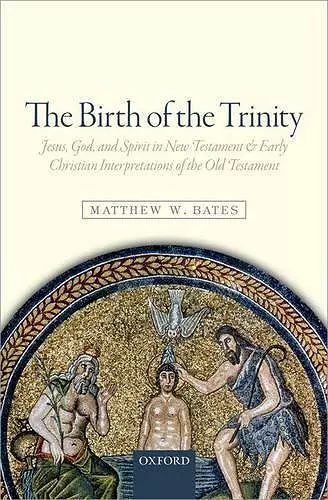The Birth of the Trinity
Jesus, God, and Spirit in New Testament and Early Christian Interpretations of the Old Testament
Format:Hardback
Publisher:Oxford University Press
Published:12th Mar '15
Currently unavailable, and unfortunately no date known when it will be back
This hardback is available in another edition too:
- Paperback£29.49(9780198779247)

This book offers a fresh perspective on how early Christians developed the concept of the Trinity, revealing their interpretations of the Old Testament.
In The Birth of the Trinity, the author presents a groundbreaking historical model that sheds light on the emergence of the concept of the Trinity within early Christianity. By examining how first- and second-century Christians interpreted the Old Testament, the book reveals the process through which they came to understand the one God as distinguishable in three distinct persons: the Father, the Son, and the Holy Spirit. This exploration not only uncovers the theological developments of the time but also highlights the intricate ways these early believers engaged with their sacred texts.
The narrative unfolds as the author illustrates how the earliest Christians perceived metaphorical dialogues among the divine persons while reading the Old Testament. These conversations, when pieced together, create a compelling narrative that reflects the dynamic and evolving understanding of God's nature within the nascent church. Rather than presenting a static view of the Trinity, The Birth of the Trinity offers a vivid depiction of divine relationships characterized by mutual respect, praise, collaboration, and profound love.
Furthermore, the book challenges contemporary scholarly perspectives, particularly those of figures like James Dunn and Bart Ehrman, by asserting that the earliest understanding of Christology was indeed the highest. Through careful analysis of biblical texts and early Christian writings, it becomes evident that Jesus was recognized as a divine person through the lens of Old Testament interpretation, leading to a rich and nuanced Trinitarian theology that resonates throughout Christian history.
Once every ten or twenty years, it seems, a book happens on the scene that promises to dislodge a long-held and often beloved paradigm. It is not that the old paradigm is necessarily abandoned, but rather it makes room for a different, equally valid one. The subtitle of The Birth of the Trinity announced such a shift and to my utmost delight delivered on that promise. * Paul Y. Hoskisson, BYU Studies Quarterly *
The Birth of the Trinity is a stunningly important book that defies easy categorization. Is it exegetical? Is it theological? Is it historical? The resounding answer to each of these questions: Yes, and much more! Setting aside widespread and long-held views about Christological development or adoptionism, or about Trinitarian theology as an intrusion into biblical faith from Hellenistic philosophy, Bates urges that early high Christology and Christian understanding of the Trinity itself were cultivated through dramatic reading of Israels Scriptures. For biblical and theological studies alike, this is a compelling game changer * Joel B. Green, Professor of New Testament Interpretation, Fuller Theological Seminary *
This is a bold and ambitious book that cuts across disciplinary lines as typically perceived, and will certainly (and reasonably) generate debate on a number of the points argued in it. But Bates makes an important contribution in underscoring how early Christians perceived the voice and person of Jesus in their (Old Testament) scriptures, and in contending that this constituted an important mode of theological reflection along the route to the doctrine of the Trinity * Larry W. Hurtado, Emeritus Professor of New Testament Language, Literature & Theology, University of Edinburgh *
In this fascinating new study Matthew W. Bates mines a stream of early Trinitarian thinking that has all too often been forgotten. Of particular importance is his attention to the continuities between the New Testament writers own ways of attending to the divine agents at which Israels Scriptures already hinted, and also to the modes of Trinitarian exegesis that remained central throughout the early Christian period * Lewis Ayres, Professor of Catholic and Historical Theology, Durham University *
In this bold and erudite study, Matthew W. Bates argues that it was not least by reading the Scriptures (the Old Testament) theo-dramatically, or prosopologically, that Jesus and his followers came very early on to Trinitarian conclusions. Scholars and students will find here a new and exciting way of investigating Christian origins. A landmark book * Matthew Levering, Perry Family Foundation Professor of Theology, Mundelein Seminary *
It is not every day that one reads a book that makes a distinct contribution to our understanding of how the New Testament authors interpret the Old Testament, sheds significant light on the reading practices of the New Testament authors by means of the early church fathers, and uses those results to make a compelling argument for the origins of the doctrine of the Trinity. But this is exactly what Bates does in The Birth of the Trinity ... a stunning achievement. * Joshua W. Jipp, Themelios *
Bates has now laid siege to the disciplinary boundary between historical criticism and constructive theology. * Matthew V. Novenson, The Expository Times *
[Bates's] approach opens up beautiful, rich Trinitarian readings. * Peter J. Leithart, First Things *
a fresh approach to Christian trinitarian interpretation... * Michael F. Bird, Patheos *
On the dust jacket Joel Green calls this book a game changer, and it certainly is that. * Patrick Madigan, Heythrop Journal *
Bates tackles an important question in an original way, bringing in relevant information from the Graeco-Roman context of the New Testament * Susan Docherty, Irish Theological Quarterly *
Bates great merit is to expound, in careful detail, New Testament instances of prosopological exegesis, helping us recognise them for what they are. * Richard Conrad, Faith *
ISBN: 9780198729563
Dimensions: 242mm x 168mm x 22mm
Weight: 536g
248 pages